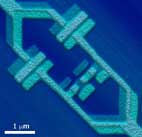Home > Press > Fundamental limitation to quantum computers
Abstract:
Quantum computers that store information in so-called quantum bits (or qubits) will be confronted with a fundamental limitation. This is the claim made by Dutch theoretical physicists from the Foundation for Fundamental Research on Matter (FOM) and Leiden University in an article recently published in the journal Physical Review Letters.
Fundamental limitation to quantum computers
July 07, 2005
A quantum computer can only function if the information exists for long enough to be processed. The so-called coherence of the qubit ensures that the quantum information remains intact. The researchers have now discovered that the coherence spontaneously disappears over the course of time and with this the stored information as well. This could pose a considerable problem for the development of a quantum computer.

Electron microscope image of a qubit from Hans Mooij's research group at Delft University of Technology. Copyright © Delft University of Technology.
|
A quantum computer makes use of the fact that a quantum mechanical system -an electron, an atom or even a larger system such as a superconducting quantum bit - can simultaneously exist in two states. Normally one of the two states disappears as soon as the system comes into contact with the outside world. The coherence then disappears as a result of the decoherence process and the information in a quantum bit is lost.
A quantum bit typically consists of a large number of particles, with an unavoidably large number of possibilities to be influenced by the environment and thus be subjected to decoherence. Jasper van Wezel, Jeroen van den Brink (FOM) and Jan Zaanen, all attached to the Lorentz Institute of Leiden University have now investigated whether it is possible to maintain the coherence in an isolated qubit.
Much to their surprise they discovered that the coherence tends to spontaneously disappear, even without external influences. The degredation process is linked to the occurrence of quantum mechanical spontaneous symmetry breaking. In classical physics an equivalent example of this process is spontaneous crystallisation in a solution. At a certain position a crystal is spontaneously formed, as a result of which the fluid structure is broken.
According to the researchers' predictions, the coherence in some highly promising concepts for qubits will disappear after about a second. Moreover, the smaller the qubits the faster that process occurs. All of this would seem to pose a fundamental limitation on the development of qubits. Experimental research will now have to demonstrate whether this phenomenon actually occurs.
The article "An Intrinsic Limit to Quantum Coherence due to Spontaneous Symmetry Breaking" was published in Physical Review Letters, in the week ending 17 June 2005.
Contact:
Dr Jeroen van den Brink
+31 (0)71 527 5510
brink@lorentz.leidenuniv.nl
Copyright © Netherlands Organisation for Scientific Research
If you have a comment, please Contact us.
Issuers of news releases, not 7th Wave, Inc. or Nanotechnology Now, are solely responsible for the accuracy of the content.
| Related Links |
![]() Foundation for Fundamental Research on Matter
Foundation for Fundamental Research on Matter
| Related News Press |
Quantum Computing
![]() Researchers develop molecular qubits that communicate at telecom frequencies October 3rd, 2025
Researchers develop molecular qubits that communicate at telecom frequencies October 3rd, 2025
![]() Researchers tackle the memory bottleneck stalling quantum computing October 3rd, 2025
Researchers tackle the memory bottleneck stalling quantum computing October 3rd, 2025
![]() Japan launches fully domestically produced quantum computer: Expo visitors to experience quantum computing firsthand August 8th, 2025
Japan launches fully domestically produced quantum computer: Expo visitors to experience quantum computing firsthand August 8th, 2025
Announcements
![]() Decoding hydrogen‑bond network of electrolyte for cryogenic durable aqueous zinc‑ion batteries January 30th, 2026
Decoding hydrogen‑bond network of electrolyte for cryogenic durable aqueous zinc‑ion batteries January 30th, 2026
![]() COF scaffold membrane with gate‑lane nanostructure for efficient Li+/Mg2+ separation January 30th, 2026
COF scaffold membrane with gate‑lane nanostructure for efficient Li+/Mg2+ separation January 30th, 2026
|
|
||
|
|
||
| The latest news from around the world, FREE | ||
|
|
||
|
|
||
| Premium Products | ||
|
|
||
|
Only the news you want to read!
Learn More |
||
|
|
||
|
Full-service, expert consulting
Learn More |
||
|
|
||








